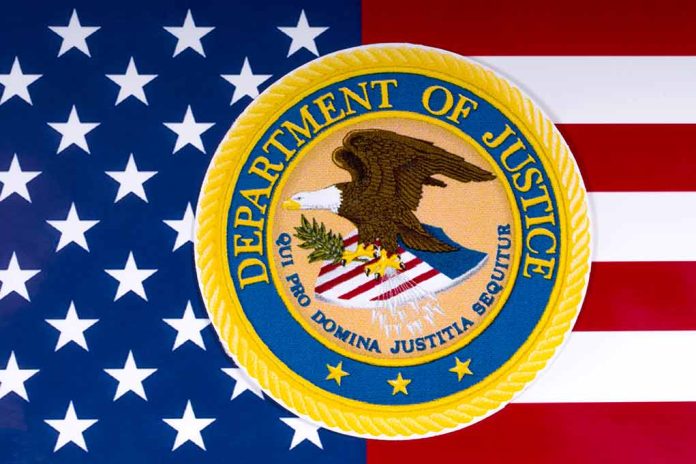
Biden’s Justice Department supports Trump’s legal immunity in Capitol Riots case, but the resolution remains uncertain.
At a Glance
- The Supreme Court ruled that former presidents have broad immunity from criminal prosecution for official acts.
- This ruling delays the Washington criminal case against Donald Trump.
- The ruling requires fresh fact-finding on allegations such as the fake electors scheme.
- President Joe Biden criticized the ruling as a disservice to the American people.
- Trump celebrated the ruling as a “big win” for democracy.
Supreme Court Ruling on Presidential Immunity
In a move that has surprised many, President Joe Biden’s Justice Department is supporting former President Donald Trump in his legal battles related to the Capitol riots. The Supreme Court recently ruled that former presidents have broad immunity from criminal prosecution for official acts. This landmark decision underscores the entrenched legal principle of presidential immunity, emphasizing the complexity and significance of this notion in the American legal and political landscape.
This ruling has delayed the Washington criminal case against Donald Trump concerning his alleged attempts to overturn the 2020 election. The indictment against Trump has not been dismissed, but the ruling is seen as a considerable victory for him, offering a temporary reprieve in the complex web of lawsuits he faces. Biden, however, criticized the ruling, stating it was a disservice to the American people.
Implications of the Ruling
The Supreme Court’s conservative majority asserted that former presidents have absolute immunity for actions within their constitutional authority. This ruling affects special counsel Jack Smith’s ability to move forward with significant allegations in the indictment. The case has been referred back to U.S. District Judge Tanya Chutkan for further analysis on whether certain actions were official or unofficial, potentially delaying the trial for several months.
Joe Biden expressed his discontent with the decision, arguing that it sets a “dangerous precedent” for future presidents. The court’s ruling necessitates fresh fact-finding on various allegations, including the fake electors scheme. The need to determine which of Trump’s actions were within his official capacity could enormously extend the timeline of the legal proceedings.
Joe Biden says presidents' immunity from prosecution created a “dangerous precedent” that place them “above the law,” after a Supreme Court ruling paved the way for Donald Trump to potentially escape prosecution for his role in the Jan. 6 US Capitol riot https://t.co/NzwGwcOk5C pic.twitter.com/gmSQgRBfe3
— Bloomberg (@business) July 2, 2024
Broader Legal Terrain and Future Impact
This ruling has far-reaching consequences, extending beyond Trump’s current legal battles. It is expected to delay other significant cases Trump is involved in, including ongoing legal challenges in Georgia and matters concerning classified documents. One major concern outlined by Democratic Congresswoman Judy Chu is that the decision might allow presidents to act improperly without consequence. She voiced the fear that this legal precedent could enable future presidents to evade accountability by claiming their actions were part of their official duties.
Even amid these legal entanglements, Trump hailed the Supreme Court’s decision as a “big win” for democracy. The ruling’s subsequent effect on Trump’s political future remains an open question, as ongoing analysis by Judge Chutkan could mean further delays in any trial until after the November presidential election.
“The president is now a king above the law.” – Justice Sonia Sotomayor
As the analysis continues, the Supreme Court’s delineation that a president has immunity for “official acts” but not for “unofficial acts” means that intricate fact-finding is necessary to determine the legality and scope of Trump’s actions. The ruling, while providing temporary relief for Trump, adds a complex layer to our understanding of presidential immunity and its legal boundaries.
“The American people will have to render a judgment about Donald Trump’s behavior,” – President Joe Biden
Sources
- What to know about the Supreme Court immunity ruling in Trump’s 2020 election interference case
- Supreme Court rules Trump is entitled to some immunity in January 6 case
- Biden says court ruling on Trump undermines rule of law
- Trump can be sued for Jan. 6 riot harm, Justice Dept. says
- Insight: Analysis: Biden’s Justice Dept may defend Trump in Capitol riot lawsuits
- Opinion Jack Smith’s Trump immunity brief highlights the prosecutor’s mistake
- Biden: Trump immunity is ‘dangerous’ for America
- Biden condemns Supreme Court’s ruling on Trump immunity case
- Trump immunity decision in balance as Supreme Court caps term
- Supreme Court’s Trump immunity ruling shows risk of Jack Smith’s approach







